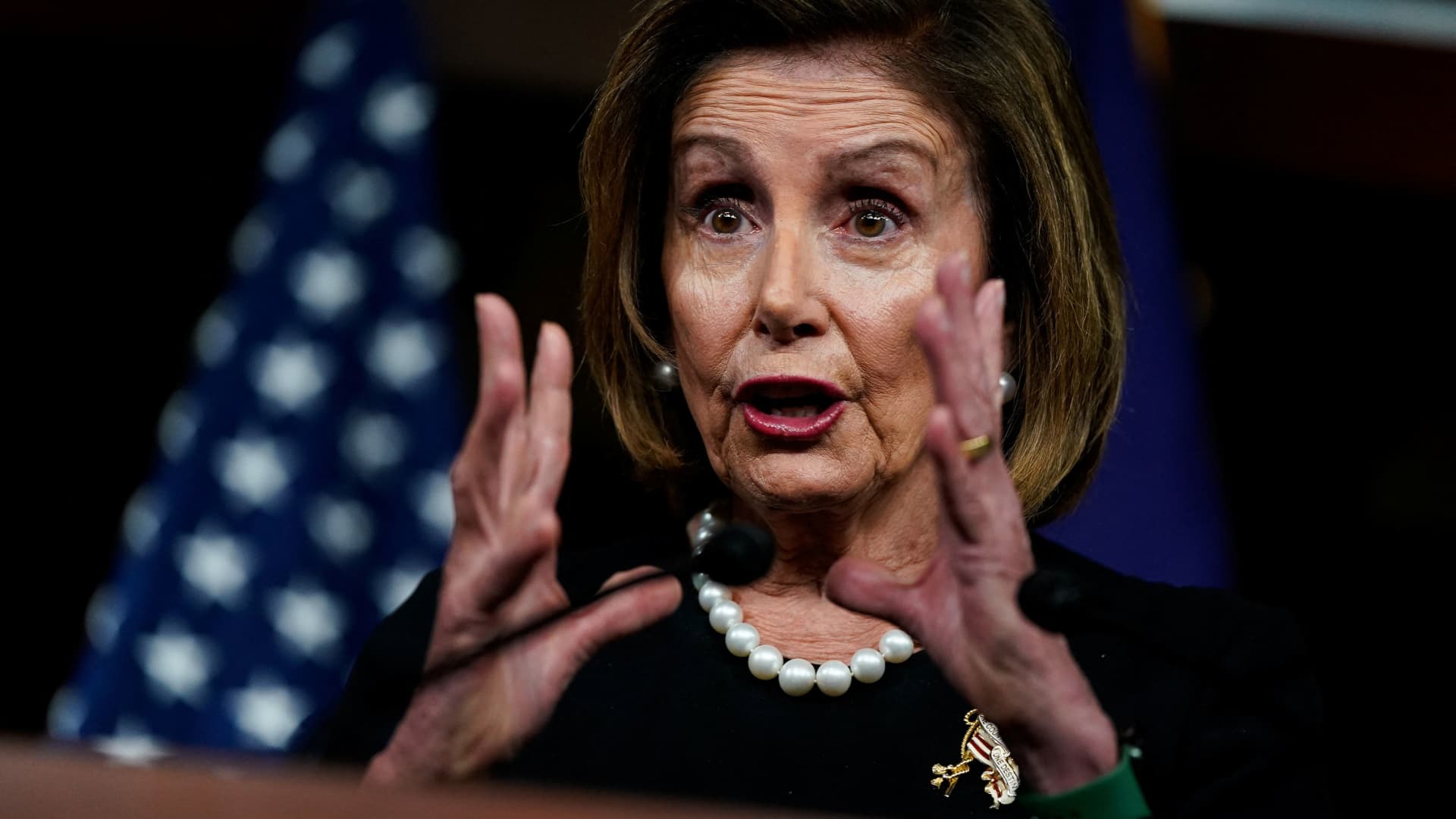U.S. House Speaker Nancy Pelosi (D-CA) holds her weekly news conference with reporters on Capitol Hill in Washington, July 14, 2022.
Elizabeth Frantz | Reuters
The House on Thursday passed bipartisan legislation to boost U.S. competitiveness with China by allocating billions of dollars toward domestic semiconductor manufacturing and science research.
The bill passed 243-187, with no Democrats voting against the bill. Twenty-five Republicans voted for the legislation, even after a last-minute push by GOP leaders to oppose it.
The bill, which passed the Senate on Wednesday, now heads to the White House for President Joe Biden to sign into law.
Lawmakers pushed to quickly approve the package before they depart Washington, D.C., for the August recess. But the final vote came after years of wrangling on Capitol Hill, with the legislation taking numerous forms, and names, in both chambers of Congress.
The ultimate version, known as the Chips and Science Act, includes more than $52 billion for U.S. companies producing computer chips, as well as billions more in tax credits to encourage investment in chip manufacturing. It also provides tens of billions of dollars to fund scientific research, and to spur the innovation and development of other U.S. technologies.
House Speaker Nancy Pelosi, D-Calif., called the bill "a major victory for American families and the American economy."
But House Republican Leader Kevin McCarthy, R-Calif., urged his colleagues to "reject this deeply flawed bill" and "start from scratch" in floor remarks before the vote.
The Senate passed the bill Wednesday in a 64-33 vote, drawing support from 17 Republicans. Among those yea votes was Senate Minority Leader Mitch McConnell, R-Ky., who previously warned that Republicans would not back the China competition bill if Democrats continued to pursue an unrelated reconciliation package.
Read more of CNBC's politics coverage:
Hours after Wednesday's bipartisan Senate vote, Senate Majority Leader Chuck Schumer, D-N.Y., and Sen. Joe Manchin, D-W.Va., revealed that they have struck a deal on a sweeping reconciliation bill. They hope to pass that package next week with just a simple majority in the Senate, which is evenly split between Republicans and Democrats with Vice President Kamala Harris casting any tiebreaking votes.
Shortly after that deal was announced, House Republican leaders urged their members to vote down the Chips and Science Act. They argued against giving multibillion-dollar subsidies to chipmakers at a time of historically high inflation, while also noting the timing of the Democrats' reconciliation deal.
"The partisan Democrat agenda has given us record inflation, and now they are poised to send our country into a crushing recession," the office of House Minority Whip Steve Scalise, R-La., said in a memo Wednesday night.
Some Republicans who opposed the bill said it lacked "guardrails" to prevent any of the funding from winding up in China's hands. Other critics have argued that the U.S. would have to spend many billions more to have a real chance at competing with the world's leading chipmakers.
But the bill's advocates say it is vital to America's economy and national security to build more chips, which are increasingly critical components in a vast array of products including consumer electronics, automobiles, health-care equipment and weapons systems.
The chips have been in short supply during the Covid-19 pandemic. Factory shutdowns at the beginning of the outbreak sidelined chip production in Asia while consumer demand for autos and upgraded home electronics that need the chips surged during the lockdowns. The U.S. share of global chip production also has fallen sharply in recent decades, while China and other nations have invested heavily in the industry.
The U.S. also makes few of the most advanced types of semiconductors, which are largely produced in Taiwan, the epicenter of rising political tensions with China.
Much modern warfare requires sophisticated semiconductors — each Javelin missile launching system contains hundreds, for instance — leading U.S. defense officials to worry about the nation's reliance on foreign producers for its chip supply.
Biden has also blamed the chip shortage for the sky-high inflation that has dogged his presidency. A lack of chips available for new-car manufacturing has been linked to soaring prices for used cars, which are pushing inflation higher.
"America invented the semiconductor. It's time to bring it home," Biden said this week.





